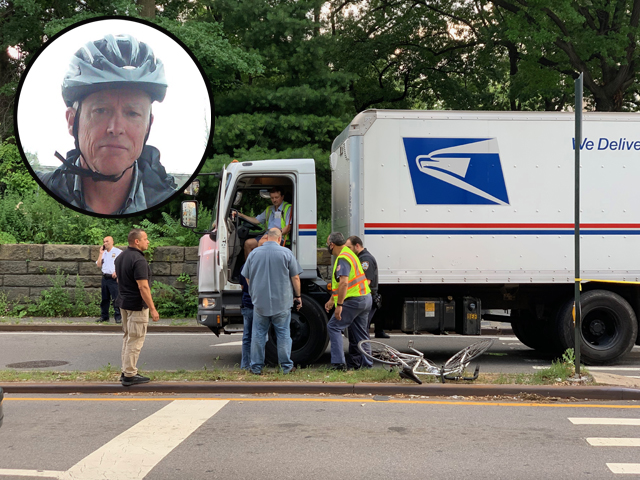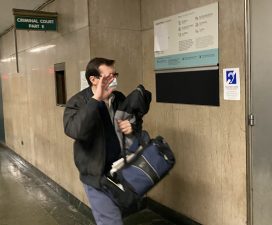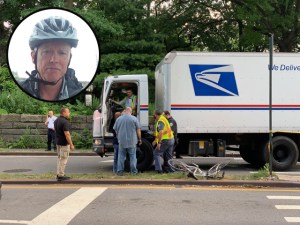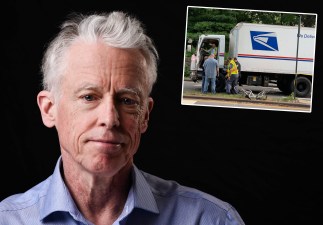USPS Victim Was a ‘Great Man’ on the Verge of Retirement When Killed on his Commute, Wife Says

The wife of 71-year-old Upper West Side cyclist Jeffrey Williamson, who was killed on Tuesday night by a postal service truck driver, knew something was wrong when her husband was 15 minutes late for dinner.
Christopher Brimer told Streetsblog on Wednesday that she called her husband’s phone, and when he did not answer, she felt uneasy. And then she got the call from police and rushed out of the Riverside Drive apartment he and her husband have shared for decades and backtracked along her husband’s usual route home from his advertising job downtown. When Brimer got there, Williamson was already being taken to St. Luke’s Hospital, where he would later die from body trauma he suffered when the unidentified United States Postal Service truck driver drove over him on Central Park West at around 5:40 p.m.
“He was a great man,” said Brimer. “He was adventurous, physically fit. He was expecting to retire in August.”

Brimer was concerned about Wilkinson’s retirement — “He was always saying, ‘What would I do when I retire’ because he could never sit still” — but now she is planning his funeral, mourning the father of her two kids, but also knowing that she will never get justice for him.
“We don’t have any expectation that anyone will be punished for what happened. The laws favor motorists too much,” she said.

The NYPD declined to provide more information about Tuesday’s crash beyond what was released that day. The agency declined to answer additional questions such as whether the postal worker was speeding or if he was distracted by his phone or by music. Police said the driver remains uncharged.

On Wednesday, Williamson’s family was eager to talk about the victim, a likely offshoot of the fact that both he and his wife started their careers in journalism — writing obits for the Bridgeport Post Telegram in Kansas, where they met.
Eventually, Williamson became a statehouse reporter before writing a novel and becoming an advertising writer when the novel didn’t sell. (Williamson’s website has a funny story about the rejection of that first novel, “Between Wars.”)
“I work hard at advertising,” Williamson wrote on his website. “I care about it. Sometimes, when I’m not wondering if I took a wrong career turn in my mid-20s, or fulminating about TMZ and the decline of American popular culture, I actually love advertising. Hopefully, some of that love will leak through, and perhaps bring a tender mist to your eyes, if you spend just a little time clicking through the site.”
The couple moved to Clifton, New Jersey, in the late 1970s, before settling on the Upper West Side in 1980. Williamson was also a pilot, but his bike was “his pride and joy,” said Brimer of her husband’s Bottecchia.
“It was the only bike he used — it’s a Tour de France-style bike,” she said. “It drew attention as an old sports car in the biking community. He loved it.”
She then added, “It’s ridiculous that he was killed while in the bike lane.”

It’s horrifying, but it’s not that ridiculous. Cyclists have long complained that even protected bike lanes like the one on Central Park West leave them completely exposed to turning vehicles — especially at high-volume intersections like the 86th Street Transverse, where Williamson was killed.
At that intersection, northbound drivers who want to turn right onto the transverse — like the USPS driver — can turn on the flashing yellow light, but must yield to northbound cyclists.
Southbound drivers who wish to turn left onto the transverse must simultaneously watch for oncoming traffic as well as cyclists like Williamson, who are continuing northbound in the bike lane.
Double-parked delivery trucks and taxis also create hazards on the bike lane, which was installed in response to the 2018 death of cyclist Madison Lyden a little bit to the south on Central Park West.
“I find that intersection quite dangerous when riding north,” said Ken Coughlin, a member of Community Board 7 and a regular cyclist. “Right-turning vehicles encroach on the bike lane, which is not at all protected there, and they frequently disregard cyclists in their impatience to get onto the transverse. DOT must immediately figure out how to eliminate deadly conflicts there, and a good start would be a split phase signal separating cyclists and turning drivers.”
Williamson is the seventh cyclist to be killed this year on New York City streets, which is a grim, but all-too-normal number through June 29 of any normal year.
But the city is experiencing an unusually bloody year for other road users: The number of pedestrians who have been killed is up 20 percent when compared to an average year during the de Blasio administration’s tenure. Overall road deaths are up 24 percent compared to the “normal” year.
Transportation Alternatives’ Executive Director Danny Harris called on the mayor and city council to do better as they undertake budget negotiations.
“If the next city budget does not expand and accelerate redesigns of dangerous corridors, cars will kill more New Yorkers,” Harris said. “We expect, at a minimum, that key programs like the Dangerous Vehicle Abatement Program and Streets Master Plan will be fully funded. The carnage plaguing our streets demands increased investment in Vision Zero programs that work.
“A budget is a statement of values,” Harris added. “We hope in the final budget of his administration that Mayor de Blasio will value saving human life over driver convenience.”
The Department of Transportation did not initially respond to requests for comments about its investigation [see update below]. The Postal Service issued a statement that did not answer specific questions about the driver’s record, prior disciplinary actions taken against him or why postal service trucks do not have side guards.
“Safety remains a priority for the Postal Service,” said spokesman Xavier Hernandez. “Prior to operating a vehicle, drivers are provided around 35 hours of training. Once cleared to operate a vehicle, drivers also receive daily safety talks, regular driver observations from driver safety instructors, along with other safety training and accident prevention measures.
“This matter is currently under investigation and we have no further information about the specifics of the incident at this time,” Hernandez added. “Thus, we cannot respond to your queries about the vehicle. That said, as information, the Postal Service is governed by federal laws respecting its equipment and vehicles.
Hernandez added that the driver has worked for the postal service for 15 years, but claimed “federal law prevents us from sharing his personnel records in response to general inquiries.”
The agency also declined to answer questions about the still-unidentified driver who killed Charles McLean in the Ocean Hill section of Brooklyn in 2019. The agency won’t say if the driver was disciplined for killing McLean, who was in a crosswalk at a stop sign when the USPS driver ran him over.
The agency has an abysmal track record for crashes, which are difficult to track because postal service trucks do not carry license plates. After the McLean killing, a Streetsblog investigation revealed that USPS drivers are so reckless that the agency paid more than $23 million in claims by New Yorkers injured or killed in crashes caused by mail company.
From 2013 to 2019, the USPS quietly settled 661 motor vehicular injury suits by New Yorkers, roughly 100 per year, with an average value of $35,000. Over the same period, the postal service has paid out roughly $353 million to settle 15,580 claims nationwide, more than 2,300 crashes per year, according to data obtained by Streetsblog in a Freedom of Information request. Details of the cases themselves were not provided.
After initial publication of this story, Department of Transportation spokesman Brian Zumhagen sent over the following statement:
At DOT we grieve for every life lost on our streets. Following this tragedy, we will review the crash location to evaluate potential further safety enhancements, as we do following any traffic fatality.
Regarding this and other collision investigations, while the bill has gone into effect [to put DOT in charge of overseeing crash investigations], it does not require DOT to establish the new unit or take on new duties until Jan. 1, 2022.
We would further clarify that DOT’s new unit will continue to work in coordination with the police department (as the law stipulates).


